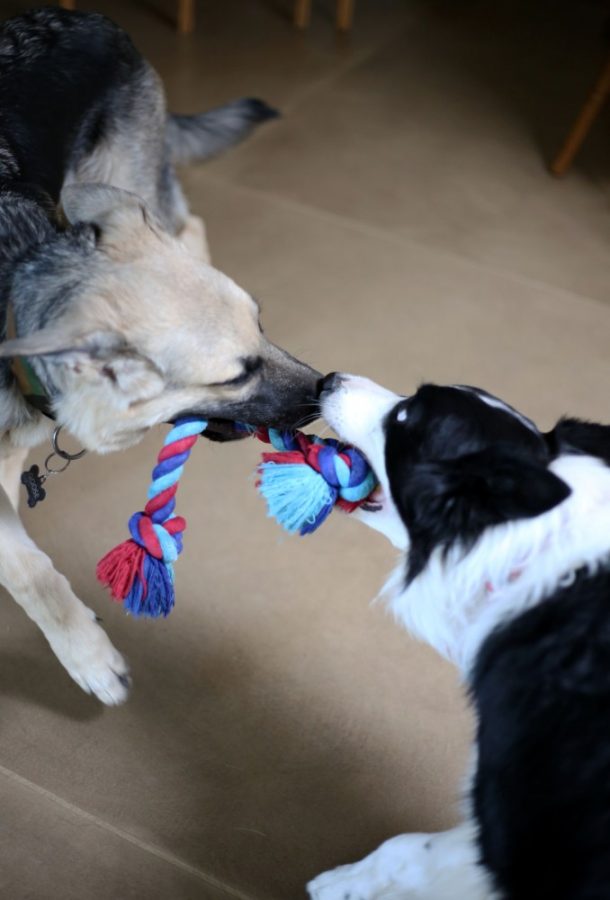Approximately 4.5 million dog bites occur in the U.S. every year, according to The Centers for Disease Control and Prevention.
The University of Arizona’s Evan MacLean, director of the Arizona Canine Cognition Center, studied hormone levels of dogs to try to discover where this aggressive behavior comes from. He did this while he was the co-director of Duke University’s Canine Cognition Center.
Currently, a common solution for dog aggression is selective serotonin reuptake inhibitors, or SSRIs, that are prescribed to balance levels of hormones that cause problematic behavior, according to the Mayo Clinic website .
“SSRIs are only effective in a subset of cases of dogs,” MacLean said. “We weren’t looking at dogs where SSRIs didn’t work.”
RELATED: The environmental cost of an iPhone
The dog hormone experiments were conducted at the Veterinary School of North Carolina State University in 2016. Data of hormone levels affected were obtained from blood samples, taken from the dogs before and after the experiment, according to Margaret Gruen.
Gruen at the time was a Ph.D candidate at NCSU, and is now a veterinary behaviorist and the co-director of the Duke Canine Cognition Center.
“The technique is [used] in saliva, and analysis [of] the plasma-separated blood samples from the dogs,” Gruen said.
Gruen did the veterinary exams of the dogs and helped with the experiment design.
MacLean began the experiments, interested in canine aggression, and came to NCSU to talk with veterinary behaviorists about different kinds of aggression. Together, the behaviorists and MacLean decided to focus on leash-associated aggression, rather than inter-dog or stranger related aggression.
“Aggression is a normal variant; it’s just problematic to walk a dog for many owners,” Gruen said. “We know the leash contributes to the aggression because it interrupts the normal dog greeting that they do.”
Dogs that had problems with aggression were recruited for the experiments. Once the aggressive dog cases were identified, MacLean went through the Duke Canine Cognition Center database and found matched controls for experiment. The matched control dogs were from many different ages, genders and breeds.
For decades, testosterone and serotonin were studied as the cause for aggressive behavior. However, MacLean and his colleagues at NCSU found vasopressin and oxytocin to be the more likely catalysts for the behavior.
They came to this conclusion after many experiments testing the dogs’ reactions. Dogs were tested for their reactions to sounds coming from another side of a curtain.
The sounds were pre-recorded dog barks, or bells. The curtain was then drawn back to either reveal a person holding a trash bag, or a dog model that was very convincing.
How the dogs reacted was recorded alongside their hormone levels.
Vasopressin is a hormone that regulates water levels in the body. In contrast to oxytocin, it has been linked to aggression in humans.
“Vasopressin in water levels is seen as yin and yang with oxytocin,” MacLean said.
RELATED: Why family weekend matters to your health
Previous research suggests that people with chronic aggression problems have high levels of vasopressin, according to the Arizona Canine Cognition Center.
The ACCC, located in the Emil W. Haury Anthropology building, runs experiments on how dogs think, solve problems and how they compare and contrast to other species. The ACCC is not involved in treatment,
just experiments and study, according to MacLean.
MacLean said some aggression is normal in animals, and a lack of aggression is actually abnormal.
“It is adaptive and common, because it plays an important role in their lives,” MacLean said. “You protect family members and you protect yourself. The problem is when it becomes pathological. They haven’t been attacked, they see another dog and become aggressive.”
MacLean said that the research is a slow process, and as with all science, one study or experiment cannot provide a definitive answer. Luckily in these experiments, the dogs don’t even realize they’re being tested.
“[The dogs] don’t even recognize that they are in an experiment, it’s all fun for them,” MacLean said.
The Arizona Canine Cognition Center designs mostly memory and communication games for dogs, and Maclean said they invite people who want to participate in studies to register in their database.
Follow Olivia Jones on Twitter.









